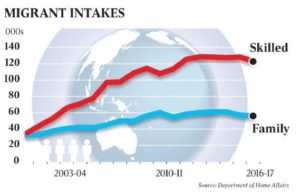Historic compact defends skilled migration program
 A leading business group has joined forces with the ACTU in an unprecedented push for a continued strong migration program in Australia.
A leading business group has joined forces with the ACTU in an unprecedented push for a continued strong migration program in Australia.
The Australian Industry Group (AiGroup) together with the ACTU and ethnic peak body groups have released a policy document calling on the federal government to maintain current levels of permanent migration.
The compact backing a so-called ‘Big Australia’ comes amid calls, mostly from right-wing groups and commentators, for the immigration rate to be cut.
AiG boss Innes Willox has long been an advocate of a high migration
intake and the ACTU’s involvement comes as it launches a campaign to reduce employers’ access to temporary foreign workers.
The first migration document of its kind in Australia’s history calls for the current goal of an annual intake of 190,000 to be retained, with long-term levels set proportionally to the population.
The accord will see the ACTU and United Voice, one of the most influential unions in the country, sign a National Compact on Permanent Migration with the peak employer body, the Australian Industry Group.
But the compact is seen as way of taking the heat out of an increasingly polarised heated immigration debate which the parties to compact says has become toxic, xenophobic and ignores the economic benefits of skilled migration.
The document, facilitated by the Migration Council of Australia, is the first time unions and employer groups have reached general agreement on skilled migration.
But included in the agreement are clauses about stricter policing of the skilled migration program.
ACTU secretary Sally McManus told media the country had a history of permanent migration for “most of the 20th century”.
“That system was predicated on civic inclusion as an Australian ideal; the idea that if you lived and worked in Australia, paid taxes and abided by the law, you should also get a say in the content of those laws, as well as the chance at full participation in our social, economic and political life,” Ms McManus said.
The issue has divided the coalition government recently, with cabinet ministers publicly disagreeing with each other over whether the annual intake should be reduced as first proposed by former prime minister Tony Abbott.
The compact follows the release of a report by Treasury and the Department of Home Affairs that backed a Big Australia and revealed that permanent annual migration was forecast to add 1 per cent to GDP growth each year for the next 30 years.
The ten-point policy document sets out crucial elements of the migration program including English language skills, evidence-based skill needs, national interest and selectivity at the same time as being non-discriminatory.
“This historic national compact brings together civil society, business and our union movement in shared tripartite commitment to migration as part of Australia’s future,” the document says.
“We affirm that Australia’s permanent migration program is essential to Australian society and our economy and do not support any reduction to the scheme,” it says.
The government has argued that the 190,000 intake was a rigid target set by the former Labor government that was based on the “quantity rather than quality” of migrants.
The Coalition reset the target to a “goal” that has been allowed to reduce to an expected 160,000 this year.
The AiGroup, representing 60,000 businesses, said it was critical that the migration program retained the confidence of the public.
“The benefits of migration are felt across every sector of the Australian economy and the skills migrants bring are vital to the development of future industries,” AiGroup chief executive Innes Willox said.
“Migration has helped Australia maintain our long record of uninterrupted growth and has assisted us in building our national infrastructure and skills base. It is important that we come to a consensus that migration is a key part of Australia’s future prosperity,” he said.
Carla Wilshire, the chief executive of the Migration Council who drove the agreement, said migration was one of Australia’s greatest strengths.
“Migration has been central to our nation-building story and the national compact creates a platform to build consensus around the importance of migration to Australia’s future,” she said.
Laurie Nowell
AMES Australia Senior Journalist












